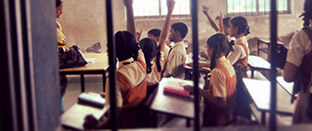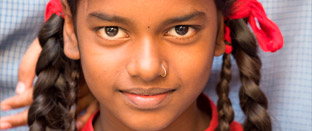WHAT CAN YOU DO


RECOMMENDATIONS

In order to respect all the people in the communities where we work, we want to share some recommendations and aspects that must be taken into account during the visits:
It is not allowed:
Make videos of the projects or the slums.
Proximity to the beneficiaries: no kisses or hugs, you cannot hold the children in your arms, etc.
Smoking during the visit.
Give gifts directly to the children during the visit.
It is allowed:
Take photos of the projects.
Post the photos on social networks by tagging us in them.
Dress code:
Out of respect for the local people, we always try to wear long trousers (both women and men) and pants or long sleeve t-shirts, never with suspenders (and no low-neck tops in the case of women). We also recommend you to wear sunglasses in summer and raincoats or umbrellas in monsoons along with gumboots if possible.
Affective manifestations in public:
The ways of expressing affection are very different in India. The custom says that you should not give kisses and greet a person (most importantly to a person with opposite sex) and the most appropriate in most cases is to shake hands as a way of greeting. Perhaps the best advice is, when it comes to greeting, to wait for the action of the other person and react according to what is offered to us.
In the case of children, it applies same as above. It may seem strange to them that someone they have just met approaches them to give them a kiss or a hug, so it is better to avoid it so as not to create misunderstandings among the local people.
This fact is also applicable to couples who come to visit our projects. It is appreciated that once in the areas of slums, or in any of the projects that are visited, the manifestations of affection openly (shaking hands, hugging or kissing) are abstained.
Smoking:
Smoking is another important point in terms of protocol, since it is not well accepted in Indian society in general. Children are educated that smoking harms their health and seeing people who visit projects smoking can confuse them. You can smoke without any problem in the secluded places of the Mumbai Smile Centers, where the person who accompanies the visits recommends that it should be done without problems.
Photos and video:
In any case it is not allowed to film children with a video camera.
Photos inside the centers (schools, classrooms, nurseries, etc.) of education projects are allowed without problems. (If in any case something could not be photographed, it would be notified in advance). If the visit is made in a group, it would be appreciated to use only one camera, since the beneficiaries will be much less bothered.
As for the photographs of the people of the slums, it is totally forbidden since they could feel offended or annoyed, and above all, what we want is to show respect for all of them. As we mentioned at the beginning, the visit to the slums is a responsible visit, we must avoid among all that it is a tourism of poverty where we take photos of people in subhuman conditions, walking through the areas of slums. Therefore, we respect their privacy.
Gifts:
In the case of visits that bring gifts for the children of the projects, they are always well received and we are very grateful, although we always recommend that people do not come loaded from Spain since in Bombay you can find everything, much cheaper and more suitable to the needs of the children here.
However, these gifts will not be delivered directly to the children since that would provoke in the minds of the children the association visits = gifts, which would not be beneficial, and would create needs that are not convenient. Normally, gifts are in terms of prizes and motivation for children and are usually given for birthdays, when they have obtained good results in studies and when there has been a general positive behavior or on holidays like Diwali, Christmas, etc.
For this reason, the gifts will be left in the Mumbai Smiles office and will later be delivered to the different projects according to the needs of the moment.
Can you interact, play with children or beneficiaries?
You can play or interact with children in kindergartens in such a way that their daily activity is not interrupted, although it is not always possible.
It also tries to facilitate interactions with families, teachers and assistants, from time to time, depending on their availability.
-
"It's impressive to see the impact that can have a goodwill, ground knowledge and the passion to help."
Visitor
-
“The visit has helped us to understand a little better the reality of India and to verify that our small contribution has been materialized for the neediest.”
Visitor
-
“Seeing kindergarten children in a healthy, safe environment and their smiles through what they learn is priceless. "
Visitante








